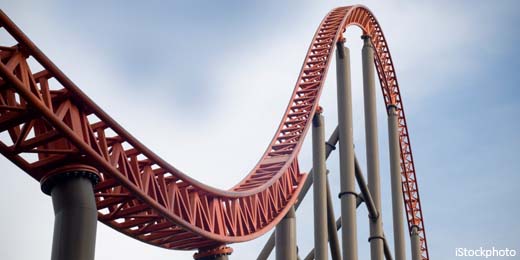What will happen to house prices in 2015?
12-31-2014

The past year has been a roller coaster one for the property market.
by Michelle McGagh
What will happen to house prices in 2015?
Last minute stamp duty reform, a general election and the threat of a mansion tax promise to make 2015 an interesting year for the property market but experts believe property prices can only go one way: up.
Regular property market watchers will know that house prices have cooled over recent months and although prices are still edging up, the increases are far below what they were at the beginning of the year.
The latest figures from the Office of National Statistics showed house prices rose at their slowest pace for seven months in October, up just 0.1%, pushing the cost of the average home to £271,000.
Annual house price inflation dropped to 10.4% in October from a seven-year high of 12.1% in September.
The latest figures from the British Bankers’ Association confirms the trend, with house purchases and remortgage approvals both down 20% when compared to last year.
Andy Knee, chief executive of property services group LMS, said the fall in property purchases may be down to the time of the year but he hoped that it was a sign of greater stability following a year of regulatory change that tightened the market but also government initiatives that boosted it.
‘Further signs of a slowing in house price growth will – on the whole – come as a welcome sign but for many, buying a house or upsizing remains far out of reach,’ he said.
‘Going into 2015 there is hope for greater stability in the marketplace so long as uncertainty ahead of the election does not play too large a role and economic conditions continue to improve. News of wage rises and a continued decline in unemployment will also serve to boost confidence.’
Still rising
The wider consensus is house prices will continue to rise, albeit at a slower pace, thanks to the last minute shot in the arm from the Autumn Statement and the reform of stamp duty. Since the announcement on 3 December, homebuyers purchasing property of less than £937,000 (totalling 98% of house purchases) will pay less stamp duty, encouraging more into the market.
Paul Smith, chief executive of estate agent Haart, said the effect of the stamp duty reforms was immediate and there was a 15% increase in enquires to its agents on the day after the announcement.
Haart data shows there were now 11 buyers chasing each property and with lenders continuing to offer low mortgage rates and stamp duty putting more money in homebuyers’ pockets, this number is expected to rise
‘We are now optimistic for 2015 and while we may not see the market reach the giddy heights of the first half of this year, which is no bad thing, we predict that property price growth will remain strong and confidence will continue to ride a high as we approach the next election,’ said Smith.
Residential property analysts Hometrack expect UK house price growth of 2% in 2015, a modest increase compared to the steep rises this year.
‘Overall, we expect modest UK house price growth of 2% in 2015, which is more in line with earnings growth,’ said Richard Donnell, research director at Hometrack.
‘Significant pent-up demand has fed back into the market in the last two years pushing house prices higher in all cities but the underlying rate of growth is now slowing across the majority of markets.’
He said the introduction of stricter mortgage affordability tests in the middle of 2014 reduced the impact of low mortgage rates on house prices.
‘A return to more modest rates of growth should be welcomed especially by the Bank of England. The ongoing health of the housing market is now about the extent to which the growth in the economy feeds into continued growth in incomes and employment.’
London slows
The biggest rises in 2014 were seen in the capital as the cost of an average home increased to £500,000. However, prices dipped 1.9% between November and December, according to Haart.
Smith said the market had now become more balanced with the number of buyer registrations reducing, although there were still 17.4 buyers on average chasing every new property in the capital.
Hometrack said annual increases in property value in London averaged £57,000 over 2014 – four times the national average – and pushed prices above their 2007 peak.
But London’s recent price falls are expected to continue while the rest of the country catches up.
‘There is clear evidence of more localised price falls starting to emerge with, for example 20% of London postcodes registering price falls in the last quarter,’ said Donnell.
‘We would expect to see further, modest price falls in the months ahead as prices re-align off a high base to what buyers are prepared to pay. Changes in demand can feed quickly into prices as we have seen in the last 18 months but it is important to remember the equation works in both directions.’

